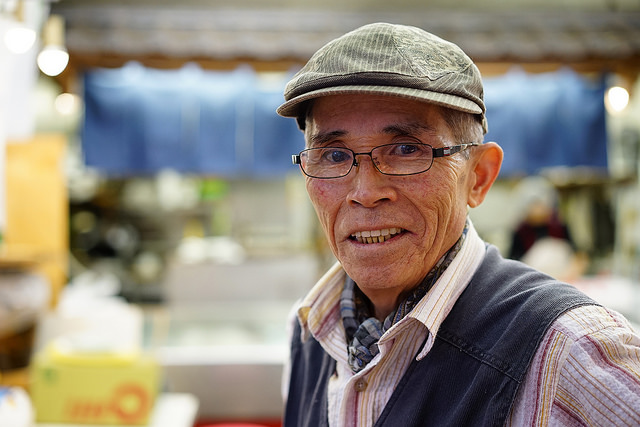The giant textbook took up two tables – half of his, and half of the table to his right. He made enough room for his lunch after pushing aside the drinks menu and the soy sauce container: a beef teriyaki bento box, with shumai instead of harumaki, and sides of wasabi mayo and mustard. The cast iron teapot steeped the genmaicha. The warm bottle of sake rested by his left hand.
Joseph signaled for a second sake, and it was only as I poured his cup did a downwards glance catch the book’s color-illustrations: warriors in full-metal jackets resembling skirts, steep triangular helmets, halberds and katana.
I glimpsed the single-word title in the margin: Samurai.
With that, the entire scenario of this balding man, sipping his green tea over his bento box lunch coagulated like a specimen in a Petri dish, like déjà-vu after a handshake, or a certain smile. Joseph’s childhood was engrained by two events: the first, always the last man standing on the gymnasium hardwood, even after the girls. The second was the afternoons afterwards, which he spent absorbing kung fu movies and Samurai epics.
These afternoons spawned his interest in karate and Bushido, honor and seppuku, qi or chi or ki or whichever two letters are currently vogue. It turned him on to The Dao, The Way, The I-Ching, and its physical counterparts like gung fu or wing chun and jeet kun do.
He ate Pocky Sticks and top-shelf ramen.
He owned his own pair of chopsticks.
He even had a sushi making kit lying around somewhere in his apartment.
All thoughts and practices and products pulled from ideologies as different as Naruto and Ni-hao Kai Lan! but falling under the umbrella in his mind of “Asian;” this alluring culture and aesthetic where he discovered acceptance. Despite never having so much as an Asian pen pal, and the closest he’s been to the continent was Lee’s Market on Central Avenue. That made the feelings even more real, not less, however. Call it faith – to believe in something without having seen it. How else did he explain his draw to the culture and the people and their way of life? Or those feelings he harbored, in the darkest crevices of his heart, that he’d be so much happier if he were born Asian?
Of course, Joseph turned a blind eye to the discrimination Asians faced, the social stigmas and the rejection outside of watered-down, trendy ideologies of feng shui and chakra balancing and Chinese take-out boxes. He didn’t notice those lofty notions of pride, honor, and perpetual motion towards becoming a Zen creature being replaced by designer products: Mercedes-Benz and Rolexes and iPhones. He only saw what the tourist books and large textbooks about Samurai life wanted him to see: the mystery, the history, the high drama.
He even started falling in love with Asian women, every single one he passed by: wandering the stacks in the library, brushing close as he left the coffee shop, standing outside of the movie theater. They whisked away his heart with a single glance, like ninjas in the Tokugawa era. He felt she (and she and her and she) would understand him better than any woman ever would. He imagined he could tell her anything, and she’d cradle his face in her soft hands and tell him it’d be alright. He loved them for the thought of them; the thought of their long black hair, demure glances and soft voices, and the way he’d hold her close during cold nights. Don’t call it a fetish, either, because he was one of them – maybe not in his eyes, his skin color or the texture of his hair, but where it really mattered. In his heart, he was a Japanese warrior.
He raised the sake glass to his lips, and to his dismay, it was empty. He sighed, closed the textbook, and all those thoughts took flight again. He was back, sitting alone in the restaurant, plain old Joseph.
He struggled with his large, white hoodie, and shimmied it over his squat frame. He donned a white ski mask to cover his face, then pulled the hood tight over his head, shielding himself from the cold outside. The large book went into his bag, a green-nylon one, the kind female soccer players toted around during fall practice, and with an awkward swing, he secured it to his back.
Have a good day, I wished him as he left.
He pulled down the mask, revealing his puffy face. He thanked me. Then he said something in Japanese, and I could only smile back. In this area, few employees in a Japanese restaurant are actually Japanese. I considered telling him, to save him the trouble or embarrassment next time. But I held my tongue, afraid to break his heart.
Photo Credit: Eric Flexyourhead
